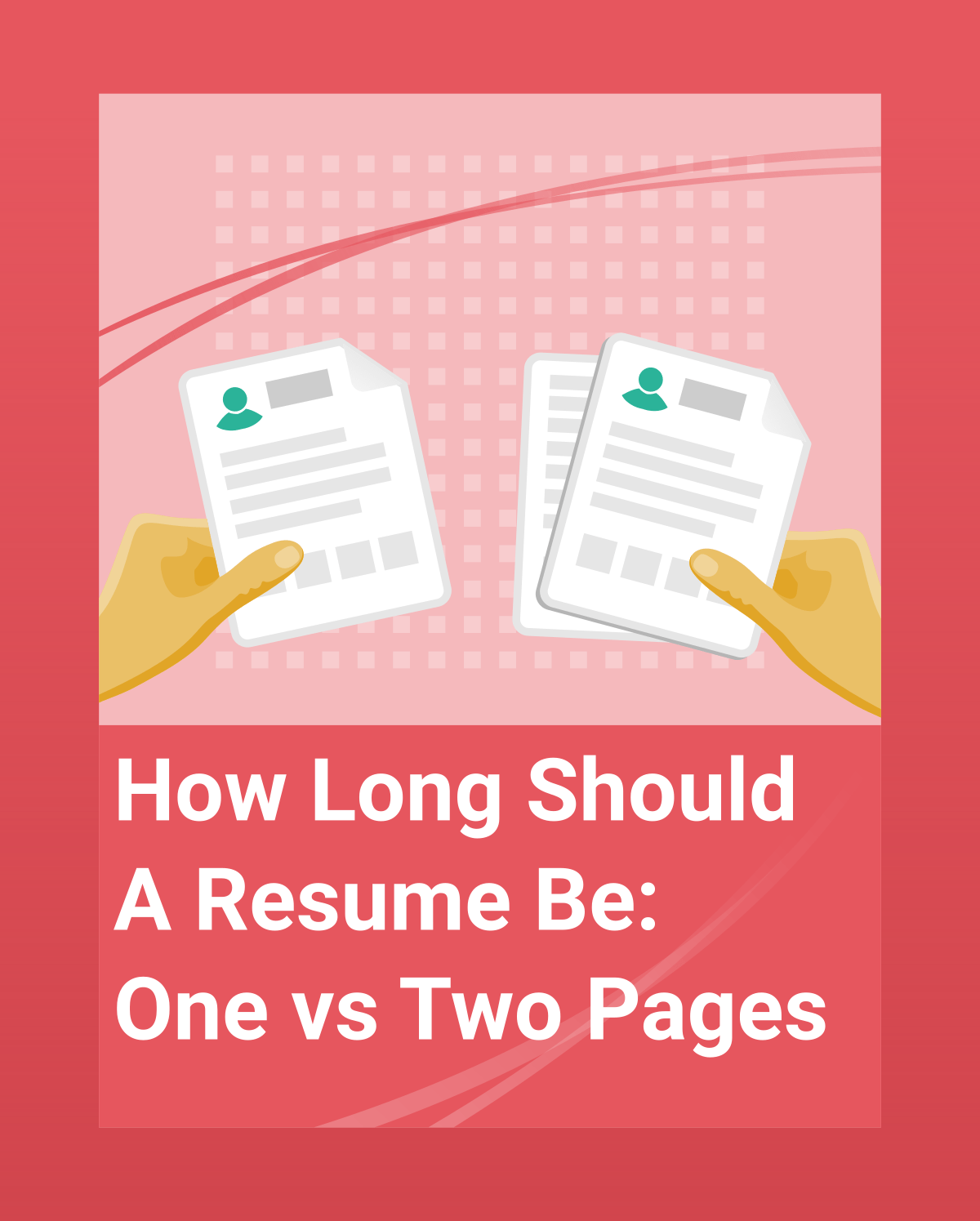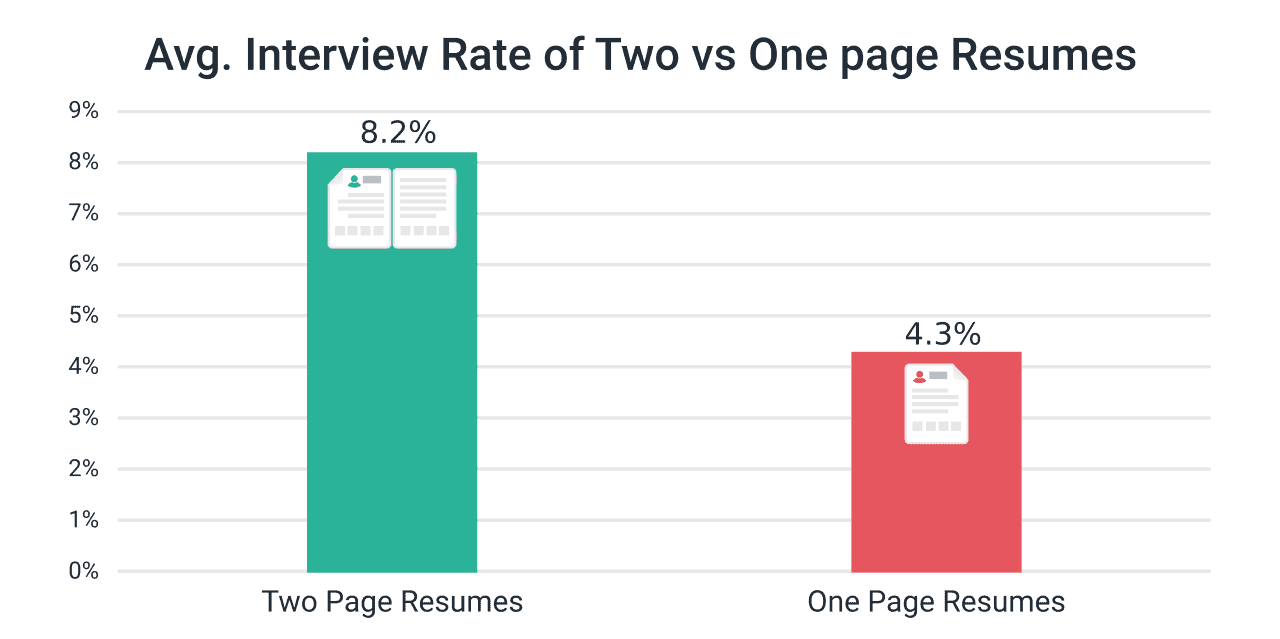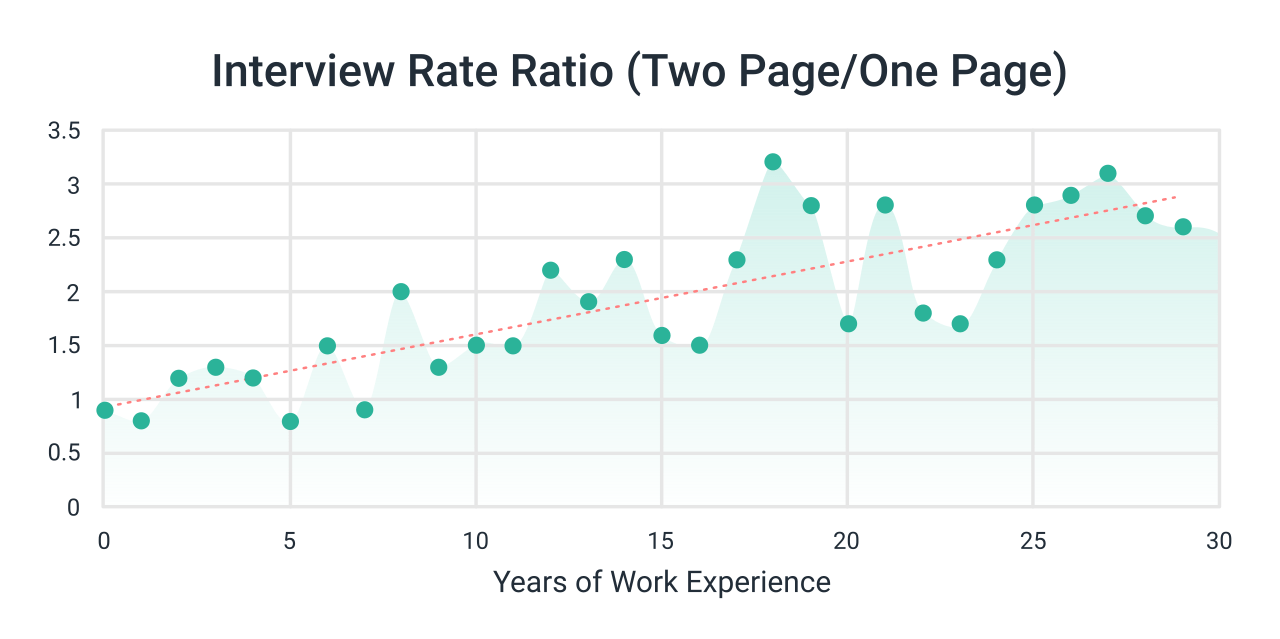How Long Should A Resume Be: One Vs Two Pages
The perfect length for a resume has always been a heavily debated question with no clear-cut answer. While some experts say a resume should never exceed one page, others argue the complete opposite. With expert opinions clashing, we decided to run a field experiment involving 6,000 real life resume submissions in order to get to the bottom of this debate. Does the length of your resume really matter? And if so, how long should it be?

KEY TAKEAWAY 1
Two page resumes received almost twice as many interviews
KEY TAKEAWAY 2
Experienced job seekers benefit more from two-page resumes
Introduction
Job seekers are often unsure of how long their resume should be. Should they try to cram everything onto one page, perhaps having to lower the font size and cut down the margins in order to do so? Or should they spread things out onto two pages, and risk having the reader get tired of parsing non-essential bullet points and reading about older, possibly less relevant work experience.
It’s certainly not an easy question. An online search for the answer to this question yields a plethora of opinions. Some write that it’s best to keep things short and concise, while others say that the more experiences and accomplishments on a resume the better. Still others claim that resume length doesn’t matter at all, or that it is very dependent on the exact situation at hand.
However, from perusing the search results, it seems that almost everyone is merely voicing their own personal opinion. In fact, we could only find a single scientific study, conducted by ResumeGo, directly examining the impact of resume length where hiring managers were put through a hiring simulation to assess their preference of one or two-page resumes. It’s also worth noting a well-known study conducted by TheLadders that found hiring managers only spend an average of 6-8 seconds reviewing each resume during the initial screening process. Given the limited and inconclusive evidence out there, we decided to conduct our own field experiment to discover the answer to this often asked question.
Methodology
For our experiment, we took the profiles of 120 job seekers whom we’ve had as clients in the past. These job seekers had a variety of academic backgrounds and work experiences. After getting their permission, we constructed both a one-page and a two-page resume for each of them (with all names, addresses, and locations changed of course). The one-page resumes had words counts between 300 and 500, while the two-page resumes had word counts between 600 and 1,000.
One additional constraint on this set of 120 job seekers we enforced was that for every integer N between 0 and 29, inclusive, precisely 4 of the job seekers had exactly N years of work experience. We ensured this uniform distribution of work experience so that we could assess any effect, if any, the number of years of work experience a job candidate has on the relative effectiveness of two vs one-page resumes.
In total, this resulted in a set of 240 resumes, and we submitted each resume to exactly 25 distinct job openings across the United States, found on online job boards such as Indeed and ZipRecruiter. Therefore, we submitted resumes to precisely 6,000 different job openings, of which half were one page in length and half were two pages in length.
Results
After each resume submission, we gave the corresponding employer exactly 28 days to reach out to us and offer an interview if they so chose. Of the 3,000 one-page resume submissions, 307 of them, or 4.3% (and with a standard deviation of 16.6), resulted in an interview offer. Of the 3,000 two-page resume submissions, 583 of them, or 8.2% (and with a standard deviation of 21.7), resulted in an interview offer. Therefore, two-page resumes yielded an interview offer 1.9 times as often as one-page resumes. These interview rates are charted below:
We also examined each of the 120 job seekers and computed the ratio of their two-page resume interview success rate to their one-page resume interview success rate. We then bucketed these success ratios by the number of years of work experience each candidate had, and then plotted the average success ratio of each bucket by the corresponding number of years of work experience. This scatter plot is shown below:
We can see visually that the relationship between work experience and the relative effectiveness of two-page resumes over one-page resumes is a fairly linear one, with a positive slope. That is, two-page resumes are more effective than one-page resumes for job candidates with many years of work experience, even though we can see that two-page resumes are still at least as effective as one-page resumes for more junior job candidates.
Conclusion
It’s fascinating how the results demonstrated that two-page resumes were more effective than one-page resumes at getting interview offers from online job submissions. It certainly contradicts the conventional wisdom shared by many online career experts. The observation that the relative effectiveness of two page resumes over one page resumes increases as the number of years of work experience a job candidate increases seems fairly intuitive, given that more experienced job candidates simply have more work history and accomplishments to write about on their resume.
Areas of further exploration include seeing whether the same disparity in interview success rate holds true among different industries, different job geographical locations, or different age groups. However, we chose not to examine any of those factors for this particular study, so that job seekers can take away a simple message that will hopefully aid them in their job search.

